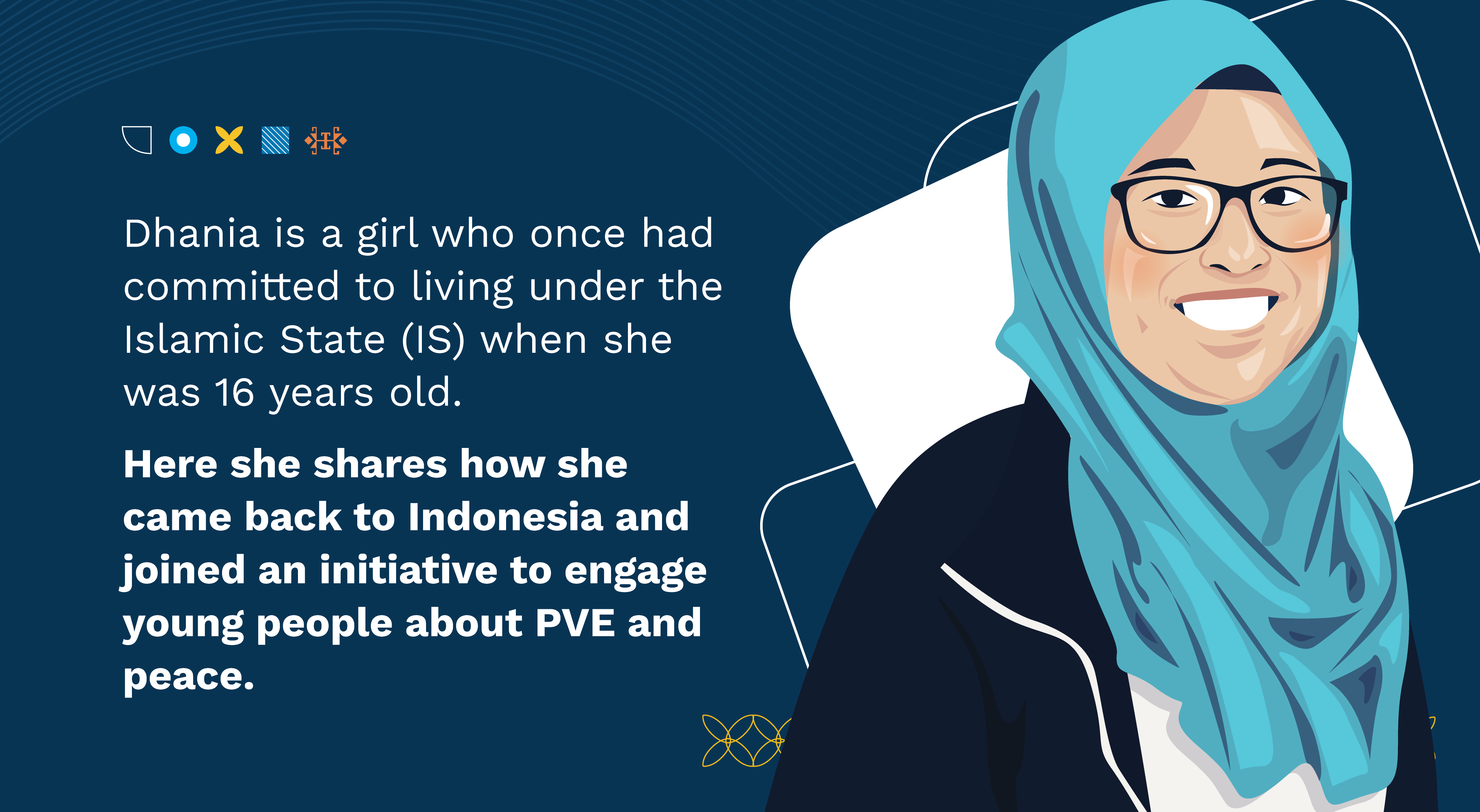Dhania’s Story:
My name is Nurshadrina Khairadhania from Indonesia. My friends and family call me ‘Nur’ or ‘Dhania’. I am a storyteller with a creepy background. Together with my 25 family members, we went to Syria in 2015 to live under “caliphate” and stayed there for two years. Disenchanted with what we saw, we escaped from Syria and finally returned home to Indonesia in August 2017.
Upon arrival in the country, we had to deal with many obstacles. Socially, most people did not trust us. For them, we were a threat to the community. Since we did not have any ID Cards or passports, it was difficult for me to continue my study, but luckily I finally graduated from senior high school in 2019. Economically, we have had to rebuild from scratch. Things are getting worse because the heads of the family, my dad and uncles went to jail for terrorism finance- supporting a terrorist organisation like IS, Islamic State.
I’m beyond grateful that I was invited by Noor Huda Ismail, a social activist who always advocates for alternative ways to challenge the narrative of radical groups like IS, to join www.ruangobrol.id. It is a community website to share the stories of reformed people like me.
Here at the community website, I actively share my experiences before, during and after ‘radicalisation’. Through this platform, I can meet researchers, peace activists, as well as other former convicted terrorists. These people have been helping me to develop myself. Through this new social network, I have started to gain the self-confidence to reintegrate into society.
Besides writing for this website, I have also shared my experience at a number of seminars, workshops, trainings, discussions and at TEDx Jakarta 2018. I do hope that my experience can help to prevent individuals, especially Indonesian youths, from going down my previous path.
Interviewer : What do you think of the role of women in creating peace and PVE?
Dhania : I think the roles of women in violent extremism [VE] are many but one of the most important roles for women is in countering VE. They can be educators or teachers. Whether it’s at home, at school or in the community.
They can educate about the importance of peace by educating people who are radicalised by VE. One of the factors that makes people get into VE groups is the lack of education. For educators, surely they can go on the field and be face to face with the perpetrators and also the victims. They could even be a mediator between the two. The role of those who go to the field can be as a companion to the perpetrators. To approach and befriend the person so that they want to get out of the VE circle. In addition, women can be good listeners, so they can find out “what is it that makes people join VE groups?” I believe that women have a big influence on their surroundings. It is also important to collaborate with the government or stakeholders in the realization of peace and justice. They can also advance in the frontline to become a negotiator by sharing knowledge, stories or positive vibes in both the offline world and social media, and invitations to increase literacy by taking part in policymaking.
Interviewer : What initiatives do you take for Peace & PVE?
Dhania : I am becoming a mentor for young people who are vulnerable and for those who have joined the VE group to help them out. I also write on media platforms with the intention of sharing experiences and different views. On the ruangobrol website itself, there is already a chat facility that can be used by the public to ask about something that is closely related to peace or VE. It could also be for those who are upset or need to chat.
Interviewer : What challenges do you face as a woman in relation to PVE and peacebuilding?
Dhania : While I have been working on this issue, I focus more on young people as a whole. Male or female. The first difficulty was in terms of public education. In this issue, even educated people still think that VE is a conspiracy/artificial/setting. So it was very difficult for the message to get across. Not to mention education in terms of stigma. Because ordinary people always stigmatize people related to the issue of VE, assuming they must be terrorists. This means returning foreign fighters face threats and hate speech from not only the VE group, but also the people of Indonesia.
Interviewer : What message do you want to convey to the World as a woman and activist for PVE & Peace?
Dhania : Usually, I tell my friends to deepen their religious knowledge. For Muslim friends to study the Koran deeply and thoroughly. Because often these VE groups use religious arguments to legitimize their actions. But, if we understand the Koran well, we are not easily trapped by the invitation. In addition, they take just one verse and then directly use it as doctrine. You should see the explanation of the verse before and after, not take it out of context. We shouldn’t forget to ask and discuss with experts. We should increase reading, improve communication with family and friends, think critically, check and re-check or tabayun, and be a good listener. To women, do not be afraid to be aware of this issue or talk about this. I think women are still fairly few in handling this. Especially because the issue of violence is usually in the area of men. I have seen many women who play an active role in PVE and peace. I once met a Nigerian woman who dared to go to the field/meet directly with VE people to find out the reasons for their actions. So the point is, to maintain peace, Indonesia must work together, a collaboration between men and women, the government, NGOs and the community.

